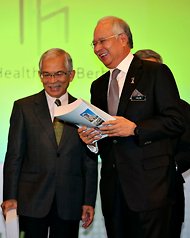Investors in Europe’s largest aerospace group also on Wednesday approved a maximum buyback of 15 percent of the group’s shares, worth 5.1 billion euros (£4.4 billion) at current prices, but Chief Executive Tom Enders said market conditions would set the actual amount.
Created from a merger of French, German and Spanish assets with a tight rein on strategy, Europe’s answer to Boeing has often been swept up in Franco-German industrial tensions, most notably when A380 superjumbo delays led to job cuts.
Although the simplified structure and a new board have been welcomed following a decade in which EADS served as lightning rod for squabbles over industrial policy, shares in the group fell more than 3 percent as Spain moved to sell part of its stake sooner than expected.
“Good luck to you, Tom, you are in the driver’s seat – not an easy task, but so far so good,” outgoing chairman Arnaud Lagardere told Enders from the platform after shareholders backed the biggest shake-up since EADS was founded in 2000.
Enders said the new rules would limit government involvement to the roles of regulator or customer, giving EADS management the independence of a “normal” company despite the fact that core government stakes are rising to 28 percent from 20 percent.
Changes include a majority-independent board to be led by former Thales CEO Denis Ranque.
Lagardere paid tribute to his father, the late French industrialist Jean-Luc Lagardere, as well as the leaders of German carmaker Daimler who jointly formed Europe’s largest aerospace company and secured Franco-German support.
He also praised Enders, promoted to CEO nine months ago, who he said would get “the keys of this huge company”.
Having waited until after Daimler to start selling shares, Lagardere’s company stands to gain from the sale of stock worth 2.5 billion euros at current prices, with shares standing at more than twice the original flotation price of 18 euros.
CORE BUSINESSES
Both the Lagardere media group and Daimler are withdrawing from EADS to focus on core businesses, with the German government picking up part of Daimler’s stake to preserve Franco-German balance in EADS.
Daimler aims to sell its remaining 7.5 percent stake in the second half of this year, a source familiar with the matter said.
In an oblique reference to strains on European integration brought about the financial crisis, Enders said EADS would not have been created as things stand today. But the aerospace group boss also told shareholders it was time to move on.
Enders pledged to prevent the buyback penalizing future growth, capital investment or a dividend policy which he said would be significantly more attractive than in the past.
EADS left open its options on how to implement the buyback, whose cost has risen sharply since it was announced in December, igniting a 39 percent rally in the shares since year end.
Enders said he would not launch a buyback worth more than a third of its net cash, suggesting an operation worth some 1 billion euros less than the full allowance. EADS had net cash of 12.29 billion euros at the end of 2012.
France and Germany will hold core stakes of 12 percent each in EADS and Spain 4 percent, with a lock-up expiring on July 31.
While supporters of Boeing, which is locked in a trade dispute with Airbus over subsidies, have said the stakes show EADS remains in the thrall of European governments, Enders said France, in particular, had relinquished real powers.
Acting through Lagardere, Paris could previously veto buys of over 500 million euros, a relatively small sum in aerospace.
Governments will have influence, just as they do over companies with defence operations worldwide, but have given up the tools to make their voices heard in the boardroom directly, Enders told reporters after the meeting.
The changes were agreed after EADS failed to buy BAE Systems last year.
A special non-voting foundation has been set up to hold any surplus government shares to avoid crossing the 30 percent threshold for a mandatory bid under Dutch law.
Spain is taking advantage of the changes to sell most of its surplus, or 1.15 percent of EADS, more quickly than expected.
The move is likely to fuel questions over whether France will also sell a 3 percent stake left outside the new government shareholder block, but officials say no decision has been taken.
The changes approved in Amsterdam on Wednesday will take effect once the transition is completed, probably on April 2. EADS said parties to the new ownership agreement had agreed to let Spain sell its extra shares between then and April 9.
(Editing by James Regan and David Holmes)
Article source: http://www.nytimes.com/reuters/2013/03/27/business/27reuters-eads-shareholders.html?partner=rss&emc=rss
